Many car owners know the frustration of turning the key in the ignition and hearing nothing but a faint clicking sound or complete silence. It’s even more frustrating when the battery seems to be in good condition. So if the battery is fine, why won’t the car start?
There could be several reasons why a car struggles to start even when the battery is fine. It could be due to a faulty starter motor, ignition system problems, fuel issues, loose connections, or a clogged catalytic converter.
In this article, we will explore the common reasons why your car struggles to start even if the battery is fine and we will provide possible solutions and tips on how to troubleshoot the problem.
Why is My Car Struggling To Start If The Battery Is Ok?
If your car is struggling to start even though the battery is okay, it could be caused by a range of issues.
One very common reason is a faulty starter motor, which is responsible for turning the engine over when you turn the key. If the starter motor fails, it can cause slow or weak cranking, preventing the engine from starting. Other possible causes include a clogged fuel filter, a malfunctioning fuel pump, or a faulty ignition switch.
Reason 1. A Bad Starter Motor
One of the most common reasons for a car not starting is a bad starter motor.
A bad starter motor can cause a car to struggle to start because it is responsible for turning the engine over when you turn the key.
When you turn the key in the ignition, it sends an electrical signal to the starter motor. The starter motor then engages a small gear, called a pinion gear, with the engine’s flywheel. As the pinion gear engages with the flywheel, it begins to turn the engine over.
The starter motor is powered by the car’s battery, which provides the high electric current needed to turn the engine over. Once the engine is running, the alternator takes over and recharges the battery.
The starter motor is made up of several components, including a motor, solenoid, and a Bendix gear. The solenoid is responsible for engaging the pinion gear with the flywheel, while the Bendix gear disengages the pinion gear once the engine is running.
If the starter motor is failing, it may not be able to generate enough power to turn the engine over, resulting in slow or weak cranking. This can cause the engine to take longer to start, or it may not start at all.
A failing starter motor can be caused by a range of issues, such as worn brushes, a faulty solenoid, or a damaged armature. In some cases, the starter motor may make a clicking or grinding noise when attempting to start the engine.
Reason 2. Loose or Damaged Battery Wiring
If the battery wiring is loose or damaged, it can prevent the battery from providing sufficient power needed to start the engine.
The battery is responsible for providing the initial power needed to activate the starter motor, which then turns the engine over. If the battery wiring is loose or damaged, it will cause a poor connection, preventing the battery from supplying enough power to start the engine.
Loose or corroded battery terminals are also a common cause of a car not starting. Over time, the battery terminals can become corroded, which can prevent a good electrical connection between the battery and the starter motor.
Reason 3. A Bad Starter Relay
A bad starter relay can also prevent a car from starting.
The starter relay is responsible for sending power to the starter motor every time the ignition is turned on. When you turn the key in the ignition, it sends an electrical signal to the starter relay. The starter relay then uses a small amount of current from the ignition switch to close a much larger circuit that sends power from the battery to the starter motor.
The starter relay is designed to handle high electrical currents, which allows it to control the flow of power to the starter motor without drawing too much power from the ignition switch. This helps to prevent damage to the ignition switch and ensures that the starter motor receives enough power to turn the engine over.
Once the starter relay is engaged, it sends power to the starter motor, which then turns the engine over. Once the engine is running, the starter motor disengages from the engine and the starter relay opens the circuit, preventing power from flowing to the starter motor.
If the starter relay is failing or has failed, it may not be able to send enough power to the starter motor, which can cause slow or weak cranking. This can make it difficult for the engine to start, or it may not start at all. In some cases, a failing starter relay may produce a clicking sound when you turn the key in the ignition.
A bad starter relay can be caused by a range of issues, such as corrosion, worn contacts, or a faulty solenoid.
Reason 4. A Clogged Fuel Filter
A clogged fuel filter can cause a car to struggle to start because it restricts the flow of fuel to the engine, which can cause a drop in fuel pressure and this can prevent the engine from receiving enough fuel to start.
The fuel filter is responsible for removing any dirt, debris, and other contaminants from the fuel before it reaches the engine. Over time, the fuel filter can become clogged with these contaminants, which can restrict the flow of fuel to the engine.
When the engine is starting, it requires a certain amount of fuel to turn over and continue to run after the starter motor disengages. If the fuel filter is clogged, it can prevent the engine from receiving enough fuel to start, which can cause slow or weak cranking or the engine may not start at all.
In addition, a clogged fuel filter can cause the engine to hesitate, misfire, or stall shortly after starting while idling.
Reason 5. Problem with the Fuel Pump or Fuel Injectors
A bad fuel injector or fuel pump can cause a car to struggle to start because it can prevent the engine from receiving the proper amount of fuel needed to start and run.
The fuel injectors are responsible for delivering fuel to the engine in a precise and timely manner. If a fuel injector is clogged, dirty, or malfunctioning, it won’t be able to deliver the proper amount of fuel to the connected engine cylinder.
This can cause slow or weak cranking or the engine may not start at all. In addition, a bad fuel injector will cause the engine to hesitate, misfire, or stall while idling or driving.
The fuel pump is also responsible for delivering fuel from the gas tank to the engine and maintaining adequate fuel pressure within the system.
If the fuel pump is failing or has failed, the fuel pressure will drop and the fuel supply to the injectors will be affected, which can often lead to the engine not starting at all.
Adequate fuel pressure ensures that the engine is receiving the proper amount of fuel needed to maintain the correct air/fuel ratio.
If the fuel pressure is too low, the engine may not receive enough fuel to maintain the correct ratio, which can cause a range of issues such as poor performance, reduced fuel efficiency, increased emissions and failure to start.
Reason 6. A Bad Oxygen Sensor
A bad oxygen sensor can affect an engine’s ability to stay running after it starts.
Oxygen sensors are responsible for monitoring the air-fuel mixture and adjusting the fuel injection to match the power needs of the engine. It does this by measuring the amount of oxygen in the exhaust gases and this is sent to the ECU where it is used to adjust the fuel mixture.
If the oxygen sensor is failing or has failed, it won’t be able to accurately measure the oxygen levels in the exhaust gases, which can cause a range of issues that can prevent the engine from starting.
If the oxygen sensor causes the engine to run too rich or too lean, this can prevent the engine from starting. If the fuel mixture is too rich, it can flood the engine preventing it from starting. If the fuel mixture is too lean, it may not provide enough fuel to keep the engine running.
Bad oxygen sensors can also cause engine misfires, because the engine may not receive the proper amount of fuel needed to ignite properly.
This can cause the engine to misfire or run roughly when starting and cause the check engine light to flash, which can prevent the engine from starting or cause it to enter “limp mode.”
What Next – How To Diagnose And Fix A Car With A Good Battery That Struggles to Start
When a car struggles to start but the battery tests fine, there are a few diagnostic steps that you can take to try to narrow down the source of the problem.
1. Run an OBD Diagnostic
Start by taking an OBD diagnostic readout of the ECU to see if there are any error codes stored in memory. Here are some common codes associated with a car not starting, not caused by a bad battery:
- P0335 – Crankshaft Position Sensor Circuit Malfunction: This code indicates that there is a problem with the crankshaft position sensor circuit, which can prevent the engine from starting.
- P0340 – Camshaft Position Sensor Circuit Malfunction: This code indicates that there is a problem with the camshaft position sensor circuit, which can prevent the engine from starting.
- P0685 – ECM/PCM Power Relay Control Circuit /Open: This code indicates that there is a problem with the power relay control circuit, which can prevent the engine control module (ECM) or powertrain control module (PCM) from receiving power and prevent the engine from starting.
- P0562 – System Voltage Low: This code indicates that the system voltage is low, which can prevent the engine from starting.
- P0191 – Fuel Rail Pressure Sensor Circuit Range/Performance: This code indicates that there is a problem with the fuel rail pressure sensor circuit, which can prevent the engine from starting.
- P0102 – Mass Air Flow Circuit Low Input: This code indicates that there is a problem with the mass air flow (MAF) sensor circuit, which can prevent the engine from starting.
- P0113 – Intake Air Temperature Circuit High Input: This code indicates that there is a problem with the intake air temperature (IAT) sensor circuit, which can prevent the engine from starting.
2. Check the Battery Voltage and Check The Wiring
Even if the battery seems fine, it’s important to check the voltage. A low voltage can cause the car to struggle to start. A voltmeter can be used to check the battery voltage. If the voltage is low, the battery may need to be charged or replaced.
The wiring loom from the battery to the alternator and starter motor can become damaged over time due to excessive heat. The wiring should be inspected for any signs of wear or damage to the outer insulation. If it’s damaged, it will usually need to be replaced entirely.
3. Inspect the Starter Motor
The starter motor should be inspected for any signs of wear or damage. Check the wiring and connectors for corrosion and ensure the connections are tight. Listen for strange knocking or clicking sounds when the car is starting as this can sometimes indicate a bad starter motor or starter solenoid.
4. Check the Ignition System
The ignition system consists of ignition coils, spark plugs and wiring and this should be checked for any signs of wear or damage. Remove each spark plug one at a time and replace any spark plugs that look brown or burnt. Ensure that the spark plugs are dry and that there is no oil on the plugs.
5. Check the Fuel System
Check the fuel filter and change it as a precaution if it hasn’t been changed in the last 2 years or 30,000 miles. The injectors and fuel pump are more difficult to check and you may need to get an expert to recondition the injectors.
A bad fuel pump is more difficult to diagnose. Sometimes when you start the ignition before starting the engine the fuel pump starts up to prime the system before the engine starts. If you don’t hear the fuel pump then this may indicate a problem.
There are also lots of OBD error codes associated with a bad fuel pump including P0201, P0267, P0268, P0231, P0232, P0030, and P0087. If any of these codes are present when you carry out a diagnostic, then you may have a bad fuel pump.
6. Check the Air Intake System for Blockages
Check the air filter, air filter housing and intake manifold for dirt or blockages. Try changing the air filter to see if it helps the engine to start. Check any hoses or pipes for leaks, including the intake manifold, as a vacuum leak can prevent the build-up of pressure within the engine and this can prevent the engine from starting.
FAQ
1. What causes a car to delay starting?
There are several reasons why a car might delay starting:
- Loose or dirty battery terminals
- Bad starter motor
- Fuel delivery problems
- Ignition issues
- Bad alternator
- Faulty sensor
- Clogged catalytic converter
- Engine damage
2. How do you tell if a starter is going bad?
If your car is struggling to start, it could be a sign that the starter is going bad. Here are a few signs to look out for:
- The engine won’t turn over when you turn the key
- You hear a clicking noise when you turn the key
- The starter motor spins but doesn’t engage the flywheel
- The starter motor engages the flywheel but the engine doesn’t start
3. Why does my car crank for so long before starting?
If your car is cranking for an extended period before starting, it could be a sign of a few different issues:
- Low fuel pressure
- Fuel injectors clogged or dirty
- Fuel pump failing
- Faulty spark plugs or ignition system
- Bad battery or alternator

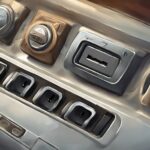



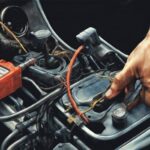
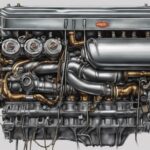

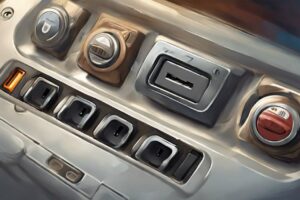
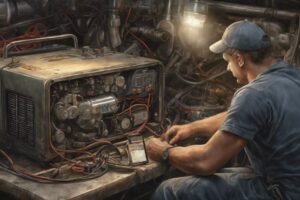
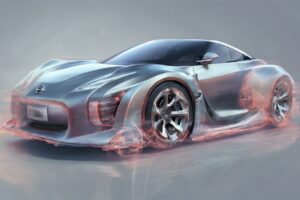
My car has been acting up recently, and every time I try to start it, it takes several tries before it finally turns over. I’m pretty sure my battery is in good condition because it’s fairly new and the lights and radio work without an issue when the engine is off. Is there a specific issue I should be looking into that’s known to cause the car to crank longer than usual before starting?
I’m facing a problem where my car cranks for a long time before it finally starts. Based on your expertise, could this issue be specifically related to the fuel pump, and if so, how could I diagnose this without professional equipment?